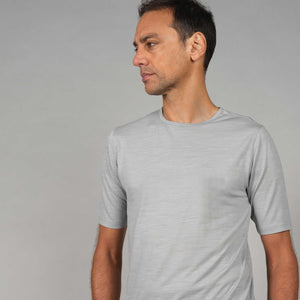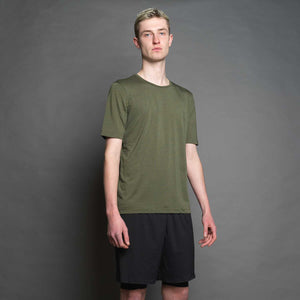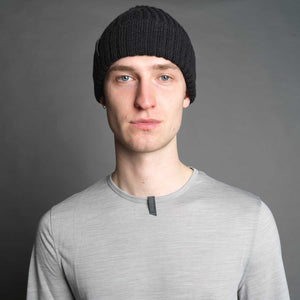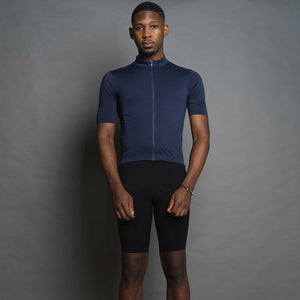ashmei-equipped On Shoulders of Giants triumph at the Talisker Whisky Atlantic Challenge
Last month, the ashmei-supported On Shoulders of Giants team rowed its way to first place in the fours category of the Talisker Whisky Atlantic Challenge. Crossing the 3,000-mile stretch from the Canary Islands to Antigua in 35 days, they worked in shifts of two-on, two-off to row continuously the entire 4,000km distance.
“It has been such an intense two month period, but it feels a bit odd now that it's over,” said navigator Rauri Hadlington, speaking to us from dry land. “You experience an awful lot while you're rowing an ocean”

While the northern hemisphere was in the middle of winter, the teams equatorial route saw them facing extreme heat and the risk of dehydration. Opening with hot calm seas, heavier going towards the final stretch meant the crew had a far from easy time of the conditions. When Rauri spoke to us from a satellite phone from the middle of the Atlantic two weeks into the row, he emphasised how tough the experience had proved. “It’s been relentless. Emotionally the ups and downs are quite amazing”, Rauri said..
“You can go from a two-hour shift where you feel like you're on top of the world to a shift where the boat feels heavy and it seems you're not getting anywhere”.
Back on land, he’s clear that this sense of relentlessness didn’t lessen off. “With the exception of seeing wildlife, which was amazing, it was just constantly more of the same, It was just relentless – you row, sleep, row, repeat.”
Despite that, between his satellite call and speaking from dry land Rauri explained that the race had become easier in a sense. “I think, the more the race felt like normal, the more that you settled into that pattern, almost the easier it became, psychologically.”
The team certainly found their stride, one way or another.
Pushing through sleep deprivation to establish an early lead, the On Shoulders of Giants team spent most of the race vying for the lead with one other rival.
“We realised we were a smaller, more lightweight crew against some probably bigger, stronger crews”, says Rauri.
“We decided to run with the conditions a bit further south and try to make as much distance as we could, even though it's not necessarily the right direction. The hope being eventually to capitalise on a more southerly position later on in the race.”
With their plan coming good around Christmas Day, New Year’s Eve nevertheless saw some of the toughest weather, forcing the crew to switch to a system of three rowers working at a time to keep the boat safe through rough seas and strong headwinds.
However, with the conditions pushing other crews downwards, the On Shoulders of Giants team were able to keep a steady course on their more southerly route.

For Rauri, winning was always in his sights, but was still a surreal achievement. “Our boat actually won the race last year too,” Rauri laughs. “It's been great from the point of view of raising money for charities. It's also great to get sort of a recognition for this project. It's been two years of hard work in the making, and probably three years of really thinking about it.”
Rauri was left with a sense of awe at those who had done the challenge in years past when technology wasn’t so developed. “One of the recurring themes of conversation while we were out there was: how did people do this?” Rauri recalls.
“From those ancient Polynesians rowing across oceans in wooden canoes to even the first people to row across the Atlantic in modern times,” he says. “In the early Woodvale race, the precursor to the Talisker Atlantic Challenge, people had to build their own boat – they’d give you a boat kit and you would have to build it.”
“It was tough enough to do it the way that we did it.”

What to wear when rowing across the Atlantic
With each pair of rowers sharing a tiny cabin at either end of the boat, this also provided storage space for kit, including several 1kg tubs of Nutella, and the ashmei kit that the team relied on throughout the race.
Having to do all their washing in salt water, while also needing to remain hygienic enough to avoid any cuts and scrapes getting infected, Merino made a natural choice for their clothing.
In hot and humid weather ashmei’s socks and shorts were constant companions for each crew member.
“Along with the shorts, the socks have been amazing. Your feet are one of the big contact points on the boat. None of us has had any issues with blisters or worse. They’re also the one thing we’re all wearing at the same time. It helps that they dry quickly and stay soft even when washed in salt water. The fact we can clip them to the rail of the boat and have them dry so fast has been really valuable too”.
Overnight our Merino Hooded Sweatshirts further provided some much-needed comfort for the rowers during their scant hours of rest.
Four men in a boat
A 35-day stretch is a very long time to spend in such a small space. However, the crew stayed friends throughout. “We're proud of our team dynamic,” says Rauri. “We've always been pragmatic in the way we propose things and our problem-solving approach to stuff. Everybody goes through periods of feeling good or feeling bad or feeling strong or tired. For the most part, when one guy's feeling a bit nervous, or there's some other issue, anyone feeling stronger can pick them up”.
Music on the boat and a stable satellite link up for communications also helped keep spirits high, especially around Christmas when each member found themselves missing family.
However, in the final days of the row, the crew found themselves torn between missing friends and family, and the worry that a return to as normal a life as the current pandemic allows would prove a bump after 18 months of training and preparation.
“There's a part of me that will miss the campaign as a whole”, says Rauri. “It's been such a huge part of my focus for the past 18 months and I think when it's all over, it'll leave a bit of a gap in life”.

Way back home
Supporting two charities, Pursuing Independent Paths which supports adults with learning disabilities and another chosen in memory of the crew’s friend Stef who died of Motor Neurone Disease, they’ve almost hit their £50,000 fundraising target.
“I spent a lot of time with Stef after his diagnosis”, says Rauri. “Seeing the strength he faced that challenge was a massive inspiration”.
As a physio working at the Wittington hospital, Rauri has returned to a situation very different to the one he left two months ago. He and his wife, who is a doctor, are still working to deal with the ongoing Covid crisis. That means normality might still be a way off for Rauri, and indeed all of the team.
“Would we do it again?” Rauri muses. “We all came off the boat saying: Absolutely not. But now I think about it, I’d certainly be interested in rowing the Pacific. Maybe even solo.”
He could certainly count on ashmei’s support for that.
All photos copyright Atlantic Campaigns



